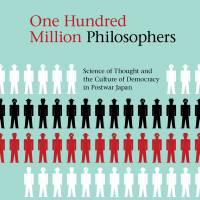In "One Hundred Million Philosophers," Historian Adam Bronson profiles "one of the longest lasting and most influential intellectual groups" of the postwar era: Science of Thought (Shiso no Kagaku). He focuses on the tumultuous period between its founding in 1946 and the 1960 Anpo protests against the U.S.-Japan security alliance.
One Hundred Million Philosophers, by Adam Bronson
272 pages
University of Hawaii Press, Nonfiction.
Created by a team of political theorists, scientists and sociologists, Science of Thought believed intellectuals had grown distant from public life and that a more inclusive civic discourse was critical for Japan's democratic project to succeed. The group conducted studies of contemporary society and published the results in an eponymous journal. Their research included analyzing popular novels, studying how individuals revise political opinions over time and promoting "life writing circles" to record the experiences of the working class.
Bronson positions Science of Thought in a larger political context, but discusses the Left almost exclusively — even though the group's journal launched the careers of public figures across the political spectrum. It is a strikingly one-sided history given Bronson's acknowledgment that the group's "deliberate ideological flexibility allowed it to outlast" other progressive organizations.
Bronson honestly evaluates Science of Thought's legacy, suggesting the rise of the middle class partially invalidated its goals. Still, its intellectual diversity and longevity made it an influential voice in Japan's postwar discourse. "One Hundred Million Philosophers" is a valuable portrait of the group and its times.



















With your current subscription plan you can comment on stories. However, before writing your first comment, please create a display name in the Profile section of your subscriber account page.